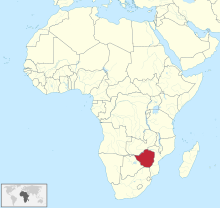Foreign volunteers in the Rhodesian Security Forces: Difference between
Non-Rhodesian army recruits from 1973 to 1980
The Rhodesian government actively recruited white personnel from other countries from the mid-1970s to address manpower shortages in the Rhodesian Security Forces during the Rhodesian Bush War. It is estimated that between 800 and 2,000 foreign volunteers enlisted, with the exact number not being known. Many of the volunteers were from the United Kingdom and United States, with some being combat veterans. They generally served alongside Rhodesian personnel, though a separate unit made up of Frenchmen was formed. The volunteers were often labelled as mercenaries by opponents of the Rhodesian regime, though the Rhodesian government did not regard or pay them as such.
The volunteers had a range of motivations. The most common motivation was opposition to governments led by black people, but other volunteers were motivated by anti-communism or a desire for adventure. They generally joined the Rhodesian Security Forces after seeing advertisements or after being contacted by recruiters. The Rhodesian government regarded the volunteers as unreliable and they often received a hostile response from members of the units they were posted to. This contributed to high desertion rates. The remaining volunteers were dismissed from the security forces in 1980 following the end of the war and Rhodesia’s transition to Zimbabwe.
In many countries it was illegal to serve with the Rhodesian Security Forces due to the sanctions that had been imposed on Rhodesia or prohibitions against mercenary activity. The governments of the United Kingdom, United States and several other countries were unable to prevent their citizens fighting for Rhodesia due to difficulties enforcing the relevant laws. The nationalist groups who opposed the Rhodesian government believed that the presence of volunteers indicated that western governments supported the regime. Few works by historians have been published on the volunteers, and they are celebrated by far right and white supremacist groups who admire Rhodesia.
Background[edit]
Political situation[edit]

Southern Rhodesia was a self-governing British colony located in southern Africa whose economy and government was dominated by the small white minority of its population. From 1962 its government was led by the Rhodesian Front political party. This party was deeply committed to maintaining the white minority’s status, with this motivating a decision to declare independence from the United Kingdom rather than submit to a transition to majority rule. Accordingly, the government issued Rhodesia’s Unilateral Declaration of Independence (UDI) from the United Kingdom in November 1965, with the colony becoming Rhodesia. UDI was illegal under British law, and was regarded as such by almost all other countries and the United Nations. Britain and the United Nations Security Council imposed wide-ranging trade and other sanctions on Rhodesia with the objective of forcing it to return to its previous status. The scope of these sanctions was increased over time, and included restrictions on support for the Rhodesian military. No country ever officially recognised Rhodesia’s independence. South Africa and Portugal provided Rhodesia with assistance, and it was able to evade the sanctions and covertly trade with many countries.
The Rhodesian Front’s ideology held that the end of colonial rule in Africa and the development of African nationalism during the 1950s and 1960s had been the result of international communism aided by a policy of appeasement towards African nationalists by the United Kingdom and other western countries. The party believed that Rhodesia needed to take a stand against the perceived communist threat to protect western civilisation in Africa. The academic Michael Evans has written that “the Front’s world-struggle ideology was based on a conspiratorial interpretation of modern politics that emphasised virulent forms of Anglophobia, anti-communism, anti-internationalism, and anti-liberalism”. He also noted that the party drew on the ideas and language used by the contemporary radical right movement in the United States to justify UDI. The historian Donal Lowry has endorsed Evans’ views, noting also that “the Rhodesia Front sought to combine the notion that Rhodesia embodied the best of true Britishness, the notion that white Rhodesians were ‘the sort of people who once made the “Great” of Britain’, while turning to America as the only remaining champion of the ‘Free World’. It took pains to not be seen as racially or politically extreme, and the party’s rhetoric was focused on the need to combat the perceived communist threat rather than the goal of sustaining racial superiority.
Rhodesian Bush War[edit]
UDI and Rhodesia’s racial inequalities led to the outbreak of the Rhodesian Bush War. The resistance to the Rhodesian regime was dominated by two black nationalist movements,…
Read More: Foreign volunteers in the Rhodesian Security Forces: Difference between

